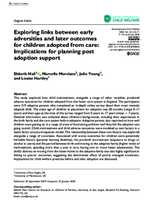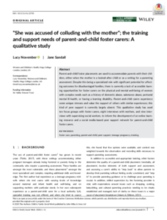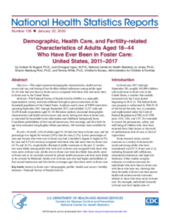Displaying 511 - 520 of 2221
This study explored how child maltreatment, alongside a range of other variables, predicted adverse outcomes for children adopted from the foster care system in England.
A qualitative program evaluation was conducted, including focus groups with 36 parenting young women who had participated in Passport to Parenting (P2P) initiative services and interviews with 11 key staff of the three partnering agencies.
The current study provides a more nuanced account of foster youth with disabilities’ transitions into adulthood.
This article identifies the steps that can be taken to support women at risk of recurrently losing children to care.
This study examined the impact of health care education materials designed for foster youth, called ICare2CHECK. It was hypothesized that ICare2CHECK would increase nonurgent ambulatory health care use and decrease emergency/urgent care use.
This study used variations in the adoption and refund status of state-level Earned Income Tax Credit (EITC), a socioeconomic policy intended to reduce poverty, to examine their effect on foster care entry rates in the U.S.
This study aimed to explain the development of the educational gap between children in “out‐of‐home care” (CLA), children deemed in social need (CIN), and other pupils.
This qualitative study has used ten focus groups with foster carers, eight interviews with mothers, and nine interviews with supervising social workers, to inform the development of an online learning resource and a social media-based peer support network for parent-and-child foster carers.
The current randomized controlled trial examined the effectiveness of Video-feedback Intervention to promote Positive Parenting and Sensitive Discipline in Foster Care (VIPP-FC) on parenting behavior and attitudes in foster parents.
This report presents demographic characteristics, health service access and use, and timing of key fertility-related milestones among adults aged 18–44 who had ever been in foster care as compared with those who had never been in foster care in the United States.



